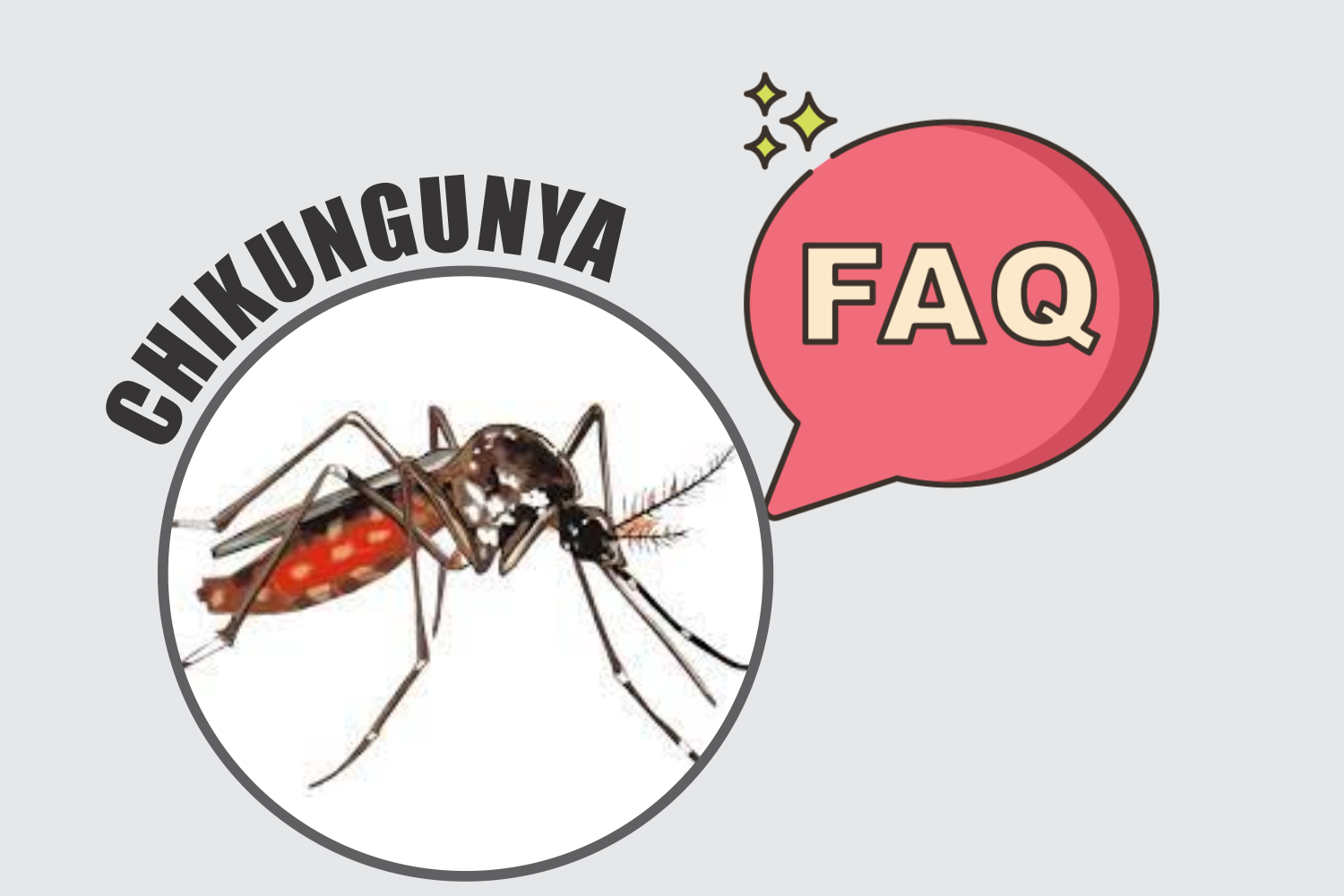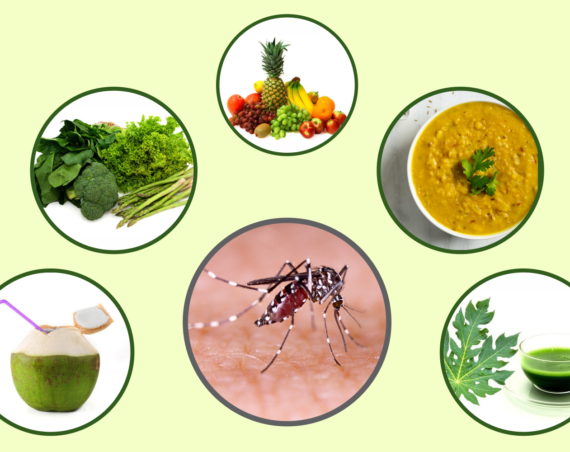1. What is Chikungunya?
Answer: Chikungunya fever (CHIKV) is a pandemic disease caused by the chikungunya virus. The Chikungunya virus is an RNA virus that belongs to the genus alphavirus of the Togaviridae family. Chikungunya mainly spreads during the early monsoon and early post-monsoon season in India.
The virus spreads by the bite of the female Aedes Species, which can be either Aedes aegypti or Aedes albopictus. These mosquitoes are also responsible for the cause of dengue fever in humans. The word “chikungunya” is an African word that means “that which bends up.” This is because chikungunya causes extreme pain of the muscles and joints and stoop postures in patients.
Besides dengue and chikungunya, the Aedes aegypti mosquito is responsible for spreading diseases such as yellow fever and zika fever. The mosquito bites aggressively in the morning (mainly active two hours after sunrise) and at sunset. The Aedes aegypti mosquito has a black body with a silver-white scale pattern and banded legs. The silver-white pattern resembles the lyre, an ancient Greek musical instrument.
2. What are the symptoms and risk factors for chikungunya?
Answer: The symptoms of Chikungunya fever appear four to seven days after the bite of an infected mosquito. It includes:
- Sudden onset of fever
- Chills
- Nausea
- Vomiting
- Dizziness and Constipation
- Sore throat
- Severe Headache
- Severe pain in the muscles and joints. Joint pain is persistent and lasts for 3-10 days.
- Swelling of the joint
- Cramps in the abdomen
- Sensitivity to light
- The appearance of big and flat skin rashes between two and five days after being bitten by an infected mosquito.
The risk factors for chikungunya include:
- People residing in an unhygienic environment with no proper disposal of garbage and sewage waste become mosquitoes’ breeding place.
- Rainwater deposited in old tyres, plastic containers, coconut shells in the garbage dump, near drainage, and the house’s backyard. The water becomes stagnant and thus becomes the breeding place for mosquitoes.
- People not applying mosquito repellent creams
- People who do not use mosquito nets during day and night time before sleeping.
- People with signs and symptoms of chikungunya can spread the disease to a healthy person.
- Pregnant women and Newborn children infected during delivery (time of birth)
- Elderly people above 60 years of age
- People having medical conditions like diabetes, hypertension, or cardiovascular disease.
3. How does chikungunya spread?
Answer: The chikungunya virus does not transmit directly from one person to another. Instead, it needs a vector for transmission. Thus, the female Aedes Species becomes the vector for transmission of the Chikungunya virus. The transmission cycle of the Chikungunya virus is similar to malaria and dengue.
Female Aedes mosquito bites humans because they need blood to produce eggs. When a female Aedes mosquito bites a patient already suffering from chikungunya, the mosquito also becomes infected with the Chikungunya virus. The virus multiplies in the salivary gland of the mosquito. When it bites a healthy person, the infected mosquito transmits the virus into the human body from its glands. The virus takes a week to mature inside the human body, and then the symptoms start to appear. This transmission cycle thus continues.
4. What is the incubation period for chikungunya?
Answer: Chikungunya incubation lasts three to seven days (range: one to twelve days) after being bitten by a female Aedes Species. Patients generally recover from chikungunya within a week (3-10 days). Once recovered, the patient is immune to further infection by the chikungunya virus.
5. How is chikungunya diagnosed?
Answer: The diagnostic tests to identify chikungunya in a patient include:
I. Serological Test
In a serological test, the physician collects a sample of the patient’s blood and sends it to the laboratory to find the presence of Chikungunya antibodies. The Chikungunya antibodies are IgG and IgM.
| Laboratory Findings | Reference Range | Interpretation |
|---|---|---|
| Chikungunya IgG Antibody |
≤ 0.79 | No detectable levels of Chikungunya IgG antibody |
| 0.80-1.09 | Chikungunya IgG antibody may be present (the possibility is there). Thus, repeat testing is required within 10-14 days. | |
| ≥ 1.10 | Indicates the presence of Chikungunya Antibody due to past or present infection. | |
| Chikungunya IgM Antibody | ≤ 0.79 | No detectable levels of Chikungunya IgM antibody |
| 0.80-1.09 | Chikungunya IgM antibody may be present (the possibility is there). Thus, repeat testing is required within 10-14 days. | |
| ≥ 1.10 | Indicates the presence of Chikungunya Antibody due to past or present infection. |
II. Antiviral Test
Antiviral Test is useful to detect the presence of the genes of the chikungunya virus in the patient’s blood sample. It is carried out with the help of the RT-PCR technique. RT-PCR stands for Reverse transcription-polymerase chain reaction.
6. Will I die from Chikungunya?
Answer: Chikungunya is a dangerous disease, but it rarely results in the death of the patient. Most of the patients recover from the illness within a week. However, the symptoms of the disease can be severe and disabling. In addition, the elderly population suffering from chikungunya may experience severe problems with other chronic illnesses. For example, some people may experience persistent joint pain for months or years.
7. What are the treatment methods for chikungunya?
Answer: There is no specific treatment or vaccine for chikungunya. It is a self-remitting disease. Physicians advise patients to intake many fluids, take complete body rest, and prescribe paracetamol to reduce fever and body pain. NSAIDs are not prescribed.
In severe cases of chikungunya, the physician goes for the following treatment plans:
- Regular monitoring of blood pressure
- Provide IV Fluid and give electrolytes
- If there is any blood loss, the physician may carry out a blood transfusion.
8. How to prevent the risk of getting chikungunya?
Answer: People should follow the following precautionary measures to prevent the infection of chikungunya.
- Apply insect repellent on your skin and wear full sleeve shirts and pants when moving out of the house.
- Always use mosquito nets on your bed before going to sleep.
- Cover windows and doors with nets to prevent the entry of mosquitoes.
- Permethrin is an insect repellent used on clothing, mosquito nets, tents, sleeping bags, and other materials to prevent the bite from mosquitoes.
- Keep your nearby environment clean and get rid of old tyres, cups, plates, and other things where rainwater gets stored and becomes stagnant.
- Spray DDT on stagnant water and near the drains to prevent the breeding of the mosquitoes.
- The diet should be rich in proteins, fibers, and Vitamin C; however, consult your healthcare physician before undergoing any diet plan due to chikungunya during pregnancy.
- Do not dump waste near water drainage and carry effective measures to dispose of sewage waste.
- Patients should intake a lot of fluids, coconut water, and orange juice.
9. Does chikungunya affect pregnant women and the fetus?
Answer: Yes, Chikungunya virus infection has been reported to affect pregnancy outcomes. The virus can transmit from mother to fetus. Short term research studies in chikungunya positive pregnant women have reported the following complications:
- Preterm delivery (<36 weeks)
- Decreased fetal movements
- Decrease in amniotic fluid volume that is less than expected according to the mother’s gestational age.
- Rupture of the amniotic sac before the actual time.
- Preterm labor pains
- Sepsis
- Complications in neonates
- There is no concrete evidence, but specific reports suggest the death of the fetus if the mother is chikungunya positive before sixteen weeks of gestation.
10. What are the health complications of chikungunya?
Answer: Chikungunya leads to the following health complications:
- Seizures
- Jaundice
- Inflammation of the cardiac muscles
- Large, fluid-filled lesions
- Diseases of the eye that includes uveitis and retinitis
- Neurological disorders such as meningoencephalitis, Guillain-Barré syndrome, myelitis, or cranial nerve palsies
- Acute renal disease
REFERENCES
- Frequently asked questions about chikungunya. Accessed at
https://www3.paho.org/hq/index.php?option=com_content&view=article&id=9260:2014-preguntas-respuestas-sobre-chikungunya&Itemid=39837&lang=en - Chikungunya: Symptoms, Complications, and Treatment. Accessed at
https://www.practo.com/health-wiki/chikungunya-symptoms-complications-and-treatment/66/article - Chikungunya Virus Infection and Pregnancy Outcome, Dr. Kalika Mathur, Ph.D, Accessed at https://www.bio-services.org/chikungunya-and-pregnancy/
- Gupta, S., & Gupta, N. (2019). Short-term pregnancy outcomes in patients chikungunya infection: An observational study. Journal of family medicine and primary care, 8(3), 985–987. https://doi.org/10.4103/jfmpc.jfmpc_274_18
- Chikungunya in pregnancy. Accessed at
https://www.babycenter.com/pregnancy/health-and-safety/chikungunya-in-pregnancy_10412711 - Chikungunya Virus. Accessed at
https://www.cdc.gov/chikungunya/symptoms/index.html - Chikungunya, Apollo Diagnostics. Accessed at
https://www.apollodiagnostics.in/disease/chikungunya - Chikungunya: Questions and Answers. Accessed at
https://www.webmd.com/a-to-z-guides/news/20140617/chikungunya-virus-questions-answers - FAQs: Frequently asked questions on Chikungunya Fever. Accessed at
https://apps.who.int/iris/handle/10665/205082





